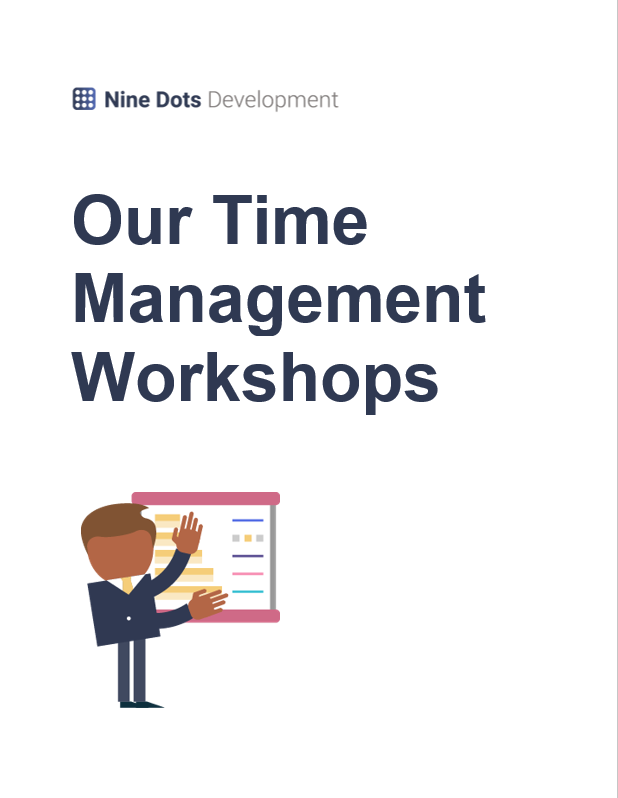Thursday 16 Sep 2021 Article
The TakeawaySaving Your Staff from Time-wasting Traps
Overwhelming Workloads
Part 1
#Time #Workload #ProtectingTime #TimeTakers #PersonalDevelopment
The perfectly matched resource for this article...
Our Time Management Workshops
If you’re looking to truly boost your staff’s time management skills to help them reach a new level of efficiency and productivity, have you considered professional time management training? If you’re unsure of where to start, we have collated all of our time and efficiency-related workshops into one PDF which you can download below.
Download!Saving Your Staff from Time-wasting Traps
Multitasking has become extremely popular but that doesn’t mean that it’s a good way of working; multitasking means that you can’t give anything your full focus or attention.
In today’s article, we explore what deep work is and why it matters, how to save your staff from falling into common time-wasting traps, and how professional time management training could help your staff reach a new level of efficiency and productivity.
What is Deep Work and Why is it Important?
Time is a finite resource; once it’s gone, we can’t ever get it back, so it’s essential that employees make the most of this precious commodity and try not to waste time. Equally, our focus is limited but invaluable - so much so that in Apple’s upcoming iOS 15, they have built in background sounds such as waves or jungle noises, designed to help users concentrate and focus!
Deep work, a concept coined by Cal Newport in his book ‘Deep Work’, is when we have solid concentration and focus on one task at a time and give it all of our attention, rather than multitasking.
Think of your attention span as a computer’s memory - if you have lots of tabs open, the computer is likely to run slowly and be inefficient for your working process, like how working on lots of tasks at once makes us less efficient. Focusing on one task at a time means that tasks can be completed more efficiently, rather than switching from task to task, and that they are completed correctly, decreasing the chance of a need for rework.
This helps you achieve more whilst being less stressed and in a timely fashion.
On the other hand, shallow work is where we do lower-level, less cognitively-taxing tasks, and often find ourselves multitasking. Researchers at the University of Oregon have concluded that “the human brain has a built-in limit on the number of discrete thoughts it can entertain at one time. The limit for most individuals is four”. This means that we certainly shouldn’t try to focus on more than 4 things at once and, whilst it is possible to focus on 4 things, it isn’t the most effective way of working. Focusing on 4 things at once means that each task only gets around 25% of our attention. This way of working is compulsive and often unsatisfying as the tasks are often very repetitive and unchallenging, and going back and forth between tasks means they take longer to complete.
However, it can be extremely difficult to get into this highly-focused mindset as deep work often involves working on tasks that require a lot of cognitive effort. One of the main reasons that most employees rarely manage to achieve deep thinking is because of the endless distractions that try to steal their time and attention and distract them. Getting into a deep-working mindset requires a clear, undistracted headspace so it’s crucial to be aware of the common time traps that employees often fall into without even realising, and know how to save them from these traps.

How to Save Your Staff from Common Time-wasting Traps
Whilst employees are ultimately responsible for how they use their time, there are many things you can do to save your staff from common time-wasting traps, including:
Research shows that employees spend around 28% of their working time reading, responding to, or composing emails, and the average employee checks their emails over 70 times a day. As James Schramko explains in his book ‘Work Less Make More’, barely anything requires our immediate attention; more often than not, it can wait. Recommending your staff to only check their emails a given amount of times a day helps prevent them from losing valuable time in their inbox.
{{ADVERT}}
Phones
One of the biggest distractions staff face every day is their mobile phones. App designers and mobile phone companies buy your time and attention; the more time you spend on their products, the more money they make. Whether it’s a phone call, alarm, text alert, or social media notification, all of these things break employees’ focus and take them away from deep work. Implementing a rule that all employees put their phones away or at least keep them on silent can help prevent this distraction and keep staff focused so they can produce their best work.
Colleagues
When in deep focus, even the simplest question can be very distracting and mean that it takes staff a while to get back into that focused mindset. One of the best ways to avoid staff being unnecessarily distracted by colleagues is to implement what we here at Nine Dots call DND (Do Not Disturb) mode. During DND, colleagues shouldn’t ask any questions or make any requests unless they are actually urgent and require immediate attention. Employees can simply say that they’re ‘going on DND’ or put their earphones in as a sign for others to not disturb them.

To-do Lists
To-do lists are designed to boost organisation and productivity however, they can quickly become employees’ worst enemy if not used properly. Parkinson’s Law states that "work expands so as to fill the time available for its completion", meaning that however much time is allocated to a task, it will take up all of that time, so it’s crucial to make sure that your staff are allocating reasonable times to the tasks on their to-do lists. However, it’s also important to remind staff to leave contingency time in their schedules as tasks can sometimes take longer than expected.
Professional Time Management Training
As we discussed earlier on in this article, time is a finite resource so it’s essential that employees make the most of this precious commodity and try not to waste it.
If you’re looking to truly boost your staff’s time management skills to help them reach a new level of efficiency and productivity, have you considered professional time management training?
If you’re unsure of where to start, we have collated all of our time and efficiency-related workshops into one PDF which you can download by clicking here.
---
Until next time...
Our Time Management Workshops
If you’re looking to truly boost your staff’s time management skills to help them reach a new level of efficiency and productivity, have you considered professional time management training? If you’re unsure of where to start, we have collated all of our time and efficiency-related workshops into one PDF which you can download below.
Download!Missed an article?
More from Overwhelming Workloads
